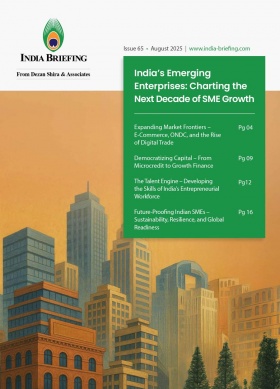Apple’s India Strategy: Balancing Local Manufacturing with Global Supply Chains
US-electronics giant Apple Inc. has sharply expanded its supply chain in India to 45 companies, according to a recent media report, including local component makers and the sub-assembly ecosystem. Tata Electronics, Bharat Forge, and Hindalco are among companies Apple has brought into its ecosystem.
Apple Inc. has substantially deepened its manufacturing footprint in India, expanding its supply chain network to include 45 companies ranging from large domestic firms to smaller component and sub-assembly manufacturers. Major Indian players such as Tata Electronics, Bharat Forge, and Hindalco have been integrated into Apple’s ecosystem, alongside over 20 micro, small, and medium enterprises (MSMEs).
This expansion has had a notable impact on employment. Per an Economic Times report, published September 29, 2025, Apple’s suppliers have created nearly 350,000 jobs in India, of which about 120,000 are direct roles. These figures are in addition to the substantial workforce engaged in the five iPhone assembly plants operated by Apple’s vendors in the country.
Expanding supply chain and production base in India
Now in its fifth year of operations in India, Apple has increasingly relied on domestic companies, such as Aeques Jabil, Microplastics, ATL, Salcomp, Foxlink, Motherson, Wipro PARI, Avary, SFO Technologies, Titan Engineering and Automation, and VVDN, to strengthen its supply chain.
Several of these firms are also preparing to leverage India’s production-linked incentive (PLI) scheme for component manufacturing.
While iPhone assembly is concentrated in five factories across Tamil Nadu and Karnataka, the wider supply chain network spans Maharashtra, Uttar Pradesh, Gujarat, Andhra Pradesh, and Haryana. According to official sources, the growing ecosystem has enabled India to account for one in every five iPhones produced globally.
CLICK HERE: Apple’s Contract Manufacturers and Component Suppliers in India
Competing with China: India’s drive to boost domestic value addition
India’s efforts to strengthen domestic value addition (DVA) in electronics have gained momentum in recent years, though challenges remain due to the sector’s globalized supply chains. Unlike industries such as ready-made garments, where most of the value chain can be localized, electronics manufacturing relies heavily on components sourced from multiple countries.
A study by the Centre for Development Studies (CDS), released in July 2025, shows that India’s mobile phone industry has made good progress, with DVA rising to 23 percent. While mobile phone assembly alone accounts for just 4 percent of a device’s selling price, the study finds that imported components constitute less than one-fourth of total inputs. This suggests that value generated within India extends well beyond simple assembly, contributing an estimated US$10 billion in total DVA during FY 2022–23.
Initiatives such as the smartphone PLI schemes, launched in 2020, have been pivotal in driving this growth. Apple’s decision to manufacture iPhones in India further accelerated the development of a stronger local ecosystem.
In the initial phase of expanding production capacity in the country, Apple deepened its supply chain by partnering with Chinese firms like Sunwoda, Shenzhen Yuto, and CCL Design, with 14 of its Chinese suppliers receiving security clearance to invest in India.
However, geopolitical tensions altered this trajectory. The border clashes in Ladakh’s Galwan Valley in 2020 and the introduction of Press Note 3, which mandated prior central government approval for foreign direct investment (FDI) from neighboring countries, prompted Apple to pivot towards non-Chinese partners. Many of these collaborations were structured as joint ventures, enabling technology transfer and skill development within India’s electronics ecosystem.
The CDS report stresses that scaling assembly operations should remain the immediate priority, rather than enforcing strict local sourcing requirements. Additionally, there is a strategic necessity of engaging with Chinese firms, given their dominance in the global electronics value chain. Greater Chinese investment in India, the report argues, could ease bottlenecks in capital goods and skilled personnel while reinforcing India’s long-term competitiveness in smartphones and semiconductors.
iPhone production pushes smartphones to the top of India’s export basket
According to the Economic Times report, Apple’s suppliers in India collectively manufactured iPhones worth more than INR 150 billion (US$1.68 billion) in May 2025.
The surge in iPhone production has been a key factor in transforming India’s overall smartphone industry into a leading export segment. By the end of FY 2024-25, smartphones had risen to the top of India’s export rankings, a remarkable leap from 167th place in 2014-15.
Trade statistics from the Department of Commerce, Ministry of Commerce and Industry, highlight the sharp upward trend in global smartphone exports from India (HS code: 851713):
- FY 2022-23: US$10,955.20 million
- FY 2023-24: US$15,572.95 million
- FY 2024-25: US$24,138.04 million
Conclusion
Apple’s expanding footprint has reinforced India’s emergence as a global hub for smartphone manufacturing, driving both domestic value addition and export competitiveness. A diversified supply chain spanning multiple states, and iPhones now among the country’s top export categories, the sector’s impact extends far beyond assembly lines.
However, sustainability of this momentum requires balancing two priorities: scaling up production and deepening domestic capabilities, while navigating the realities of a globally interdependent supply chain. Strategic partnerships-whether with Indian firms or carefully managed foreign investments-will remain central to India’s ability to enhance value addition and secure its place as a leading player in the global electronics industry.
(US$1 = INR 88.79)
Navigate India’s dynamic market with confidence. Our Business Intelligence experts provide tailored insights to drive your success.
About Us
India Briefing is one of five regional publications under the Asia Briefing brand. It is supported by Dezan Shira & Associates, a pan-Asia, multi-disciplinary professional services firm that assists foreign investors throughout Asia, including through offices in Delhi, Mumbai, and Bengaluru in India. Dezan Shira & Associates also maintains offices or has alliance partners assisting foreign investors in China, Hong Kong SAR, Vietnam, Indonesia, Singapore, Malaysia, Mongolia, Dubai (UAE), Japan, South Korea, Nepal, The Philippines, Sri Lanka, Thailand, Italy, Germany, Bangladesh, Australia, United States, and United Kingdom and Ireland.
For a complimentary subscription to India Briefing’s content products, please click here. For support with establishing a business in India or for assistance in analyzing and entering markets, please contact the firm at india@dezshira.com or visit our website at www.dezshira.com.
- Previous Article Why Are Automobiles in India Becoming Cheaper After the GST Rates Change?
- Next Article Extended Producer Responsibility in India: Notes for Foreign Manufacturers












